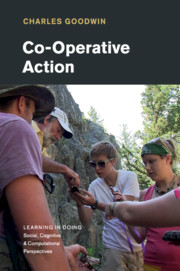Book contents
- Co-Operative Action
- Learning in Doing: Social, Cognitive and Computational Perspectives
- Co-Operative Action
- Copyright page
- Dedication
- Contents
- Figures
- Acknowledgments
- 1 What Is Co-Operative Action, and Why Is It Important?
- Part I Co-Operative Accumulative Action
- Part II Intertwined Semiosis
- Part III Embodied Interaction
- Part IV Co-Operative Action with Predecessors
- Part V Professional Vision, Transforming Sensory Experience into Types, and the Creation of Competent Inhabitants
- 20 The Emergence of Conventionalized Signs within the Natural World
- 21 Calibrating Experience and Knowledge by Touching the World Together
- 22 The Blackness of Black
- 23 Building Skilled, Knowing Actors and the Phenomenal Objects They Are Trusted to Know
- 24 Professional Vision
- 25 Conclusion
- References Cited
- Index
- Series page
21 - Calibrating Experience and Knowledge by Touching the World Together
from Part V - Professional Vision, Transforming Sensory Experience into Types, and the Creation of Competent Inhabitants
Published online by Cambridge University Press: 03 November 2017
- Co-Operative Action
- Learning in Doing: Social, Cognitive and Computational Perspectives
- Co-Operative Action
- Copyright page
- Dedication
- Contents
- Figures
- Acknowledgments
- 1 What Is Co-Operative Action, and Why Is It Important?
- Part I Co-Operative Accumulative Action
- Part II Intertwined Semiosis
- Part III Embodied Interaction
- Part IV Co-Operative Action with Predecessors
- Part V Professional Vision, Transforming Sensory Experience into Types, and the Creation of Competent Inhabitants
- 20 The Emergence of Conventionalized Signs within the Natural World
- 21 Calibrating Experience and Knowledge by Touching the World Together
- 22 The Blackness of Black
- 23 Building Skilled, Knowing Actors and the Phenomenal Objects They Are Trusted to Know
- 24 Professional Vision
- 25 Conclusion
- References Cited
- Index
- Series page
Summary
Chapter 20 argued that Symbols, types recognized through rule or “convention” rather than inherent meaningfulness, not only emerge within co-operative action, but indeed are themselves forms of co-operative action. Focusing on the apprenticeship of young geologists in the field, two intertwined issues are investigated here. First, what forms of practice and sedimented skill make it possible for the nonnatural signs produced by one individual to be not only recognized, but also trusted by another? Second, how is an individual’s qualitative, sensory experience – haptic, visual, etc. – of the world being encountered transformed through public practice into the abstract types that animate and sustain the discourse and knowledge of the community? Co-operative practices regiment individual experience and perception within a public arena to create the sensorium, and the phenomenal world, of a profession. More simply, how are embodied knowledge, skill, and professional vision calibrated through systematic practice to create both the competent actors, and the public sensorium, that sustain a community’s distinctive ways of knowing, experiencing, and acting within the world that is the focus of its activities?
* * *
- Type
- Chapter
- Information
- Co-Operative Action , pp. 348 - 362Publisher: Cambridge University PressPrint publication year: 2017



